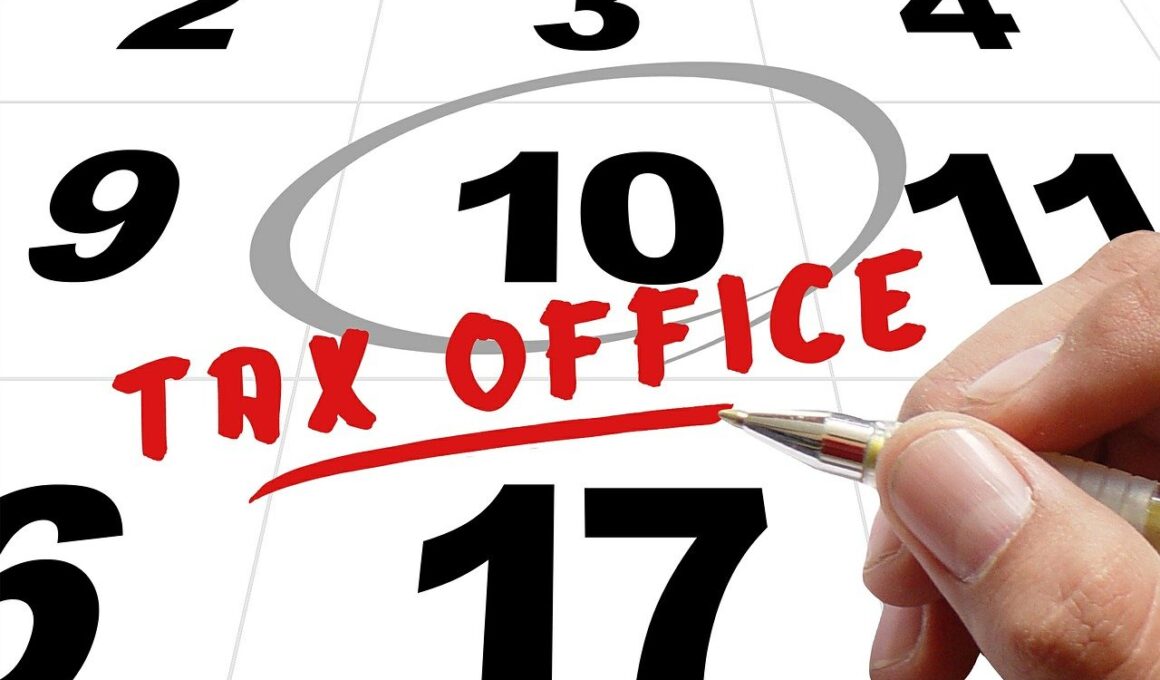Filing Taxes on Time: Best Practices for Meeting Deadlines
Filing your taxes on time is crucial to avoid penalties and ensure compliance with regulations. Understanding tax deadlines can be overwhelming due to their complexity. Begin by marking the key dates on a calendar. This ensures you won’t miss important deadlines. For individuals, the federal tax return deadline is typically April 15th, while many states have their own deadlines. Self-employed individuals should also keep in mind the quarterly estimated tax due dates. Consider using reminders on your phone or an online calendar to stay informed. Additionally, gather all necessary documentation ahead of time, such as W-2s, 1099s, and other financial records. This helps eliminate last-minute stress. If you anticipate challenges, file an extension instead of rushing through your process. However, be cautious, as this doesn’t extend your time for payment. Prioritize keeping your documents organized in one location. Proper preparation reduces errors and enhances the chances of a smoother filing experience. Utilize resources like webpages or local workshops to further your understanding of tax obligations.
Following the initial steps, it’s essential to choose the right filing method according to your situation. You can select between electronic filing, which is faster, or paper filing, which may take significantly longer. Electronic filing is more efficient, allowing for quicker processing and refunds. There are various software options available that guide you in completing your return accurately. Many offer intuitive interfaces that simplify the process for beginners. While filing, ensure that you input all information correctly, as inaccuracies can lead to audits or penalties later. Reviewing your return multiple times greatly increases the accuracy of data entered. Consider enlisting a professional tax preparer if your situation is complicated or you have numerous deductions. They help identify potential savings and ensure compliance. It’s crucial to follow each step thoroughly when filing forms. Always double-check personal information and income amounts to prevent discrepancies. Keep in mind that waiting until the last minute can result in rushed decisions. Start early to ensure adequate time is available for submission without errors, allowing you to manage any unforeseen issues smoothly.
Understanding Extensions and Consequences
If you cannot meet the tax deadlines, consider filing for an extension. An extension provides additional time to prepare your tax documents, ideally until October 15th for federal taxes. Remember, this extension applies only to the filing date, not the payment date. Failure to pay on time can result in significant penalties and interest on any unpaid taxes, which accumulate quickly. It’s essential to estimate your tax liability and make a partial payment with your extension request to mitigate penalties. If you find yourself frequently requiring extensions, assess your financial organization skills and attempt to improve your planning. Regular reviews of your financial records throughout the year help ensure that you can prepare your taxes accurately and punctually. Keeping track of changes in tax laws or new credits is vital as they can impact your filing responsibilities. Utilize reliable tax preparation resources and tools to remain informed and prepared. Additionally, consider reaching out to professionals who specialize in tax laws to clarify your doubts and ensure compliance.
Another best practice when meeting tax deadlines is maintaining diligent and organized records throughout the year. By keeping track of your income, expenses, and relevant tax documents in real-time, you reduce the risk of last-minute scrambles. This preparation includes retaining receipts, invoices, and bank statements, ensuring that you have ample proof when filing. Digitizing documents can lead to a more streamlined and efficient process, where you have easy access to records at any time. Moreover, using cloud storage or dedicated software enables you to categorize and find documents quickly when needed. Consider setting up a system that allows for periodic reviews of your records, ensuring that you stay on top of financial obligations. This method helps to prevent any surprises when tax season arrives. Regularly checking for any unaccounted income or deductible expenses can further facilitate accurate tax returns. If uncertain about what counts, consult IRS guidelines to avoid overlooking significant deductions. Furthermore, maintaining clear financial pathways is also essential to yield better results when applying for future loans or grants.
Common Mistakes to Avoid
While filing taxes can be stressful, avoiding common mistakes enhances the likelihood of timely submission. Many taxpayers often neglect to sign their returns or provide the correct Social Security numbers for dependents. Failing to verify all relevant forms can lead to hazardous delays. Mistakes in calculations can also lead to a ripple effect of complications. Consider using tax software that provides built-in error checks to minimize such issues. This program can automatically cross-reference the inputs and notify users about potential errors or missing information. Another frequent error is improperly categorizing expenses which can impact your tax liability. Ensure that each expense is correctly attributed according to IRS classifications to avoid audits. Taxpayers should also research potential deductions during filing; many overlook significant tax credits available that could lower their taxable income. Ignoring these may cost you money in potential refunds. Always aim to double-check information and engage a second pair of eyes when necessary. Taking these steps will help maintain accuracy and improve your experience with the overall tax-filing process.
Lastly, remaining updated on tax regulations and leveraging available resources can significantly impact your tax preparedness. The IRS provides a wealth of information on their official website, offering guides, forms, and clarifications on complex tax issues. Consider subscribing to IRS newsletters that keep you informed about recent changes to tax laws or relevant updates. Additionally, many local libraries and community organizations host free tax workshops; attending these can provide invaluable insights into navigating the complexities of taxes. Online forums and social media groups allow for community engagement, enabling you to share experiences and ask questions. Engaging with others facing similar challenges creates a support network and can introduce you to new tips. Another essential part of your tax journey is connecting with a tax advisor or professional who can provide personalized advice. Their expertise can help you maximize deductions and identify potential savings you might have overlooked. Remember, staying proactive and informed prepares you to tackle upcoming tax seasons confidently, ensuring timely filings with no unnecessary penalties.
Conclusion: Embrace Best Practices
In conclusion, staying punctual with tax filings is essential for financial peace of mind. By actively preparing, understanding deadlines, and utilizing resources available to you, the stress associated with taxes can be significantly reduced. Establishing a routine of financial organization ensures you can meet deadlines without undue pressure. Additionally, viewing tax filing as an integral part of your yearly fiscal strategy rather than a chore encourages better planning and engagement. Taking proactive steps throughout the year enables you to approach tax season with confidence. Keep a detailed record of your earnings and expenditures and stay informed about tax codes and potential deductions. Engaging with professionals when needed is also prudent, assisting in navigating complex tax scenarios. Avoiding common pitfalls, such as missing deadlines or incorrect filings, enhances your overall experience. Lastly, fostering knowledge about tax processes and leveraging technological advancements simplifies the task ahead. By embracing these best practices, you prepare yourself to meet your tax obligations efficiently, ensuring a smooth financial journey each year.


